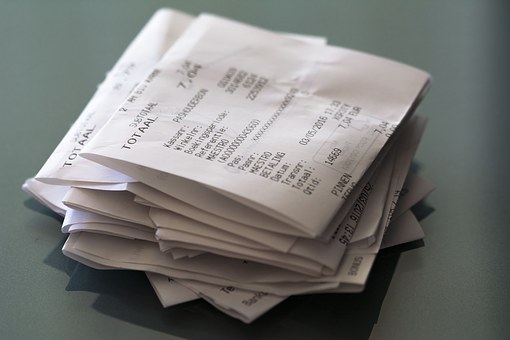This post is a follow-up to Organizing Paperwork, per request.
What to keep and what to toss? This is a key question when talking about paperwork. Organizing trash isn’t so helpful; organizing tools will help a lot.
Which brings us to the two key questions:
Will you need or want that record again?
If you need a record for business purposes or tax records or reimbursement or returning a product to the store or proving a warranty or ownership, those are all good reasons to keep a piece of paper.
But be sure you actually do need it. Because 1) you think you should but aren’t sure why or 2) you don’t really know what you need or 3) you think everyone else keeps them — all not good reasons. You can check with your accountant or the IRS recommendations for business and tax needs. Keep what you need to and be free with the rest. You can keep a receipt for a machine part until it is installed and working, or clothes until you wash and wear them, but then you won’t be returning those things. If you don’t track individual expenses in those categories, you probably don’t need the paper anymore.
I keep my pending receipts like that in one place and recommend you do too. Scattered doesn’t help you find them, and one place is easy to keep current. A clip on the refrigerator, an envelope in the desk, a pocket in your wallet, whatever works for you. Once the paper is not needed, I snap a photo for our electronic file and toss the paper.
If you want to have access to paper records for sentimental reasons, that is a valid reason also. You treasure greeting cards from the past, and that’s ok. But be careful you don’t overweigh the sentimental value with the clutter. If you don’t have adequate storage, you need to reevaluate how you are using the space you have.
Know your needs and be able to apply them to the papers floating around your life.
Is paper the best format?
Now that you’ve answered whether it is good to keep the record at all, you can move to the next question. Does it need to be paper?
For expense records, keep in mind that most accounts now have online records. Your bank statement has proof of purchase and bill payment records. Your utilities have past statements showing usage. If all you need is a reference, that may be sufficient.
Would a scan work just as well? You can invest in a scanner or simply take digital pictures of many things. If you’d rather have your bills in your hands, so to speak, you can download the statements off the website in pdfs for your files too. These files can all be kept in cloud storage, like Evernote, or on your personal computer, backed up with an external hard drive.
There is a difference between the title to your vehicle and your last water bill. Electronic storage is usually safe enough for bills and such.
The same is true for some sentimental papers. Greeting cards can be scanned or photographed. Every day your neighbor brings over a special offering from kindergarten arts & crafts that day. Lovely! You can keep a few precious ones, but the others could be photographed or scanned for enjoyment later instead of taking up physical space. Your refrigerator can be a revolving door: display, document, dispose.
Finally, this is also true for personal reference materials, such as vacation ideas, Bible study notes, appliance manuals, whatever takes up paper space in your life. These can be downloaded or scanned to file storage and referenced as needed instead of taking up drawer space, counter space, or shelf space.
I had a ton of papers from childhood and years past that I did not want to toss, but the big file cabinet was not a good idea anymore. All the contents were consolidated to two banker’s boxes using this reasoning, and the rest was scanned. I actually enjoy referencing some of the scanned items more now that I can easily pull them up!
